Thomas James Richards, Diaries, Transcript Vol. 1, 26 August 1914 to 24 April 1915 - Part 3
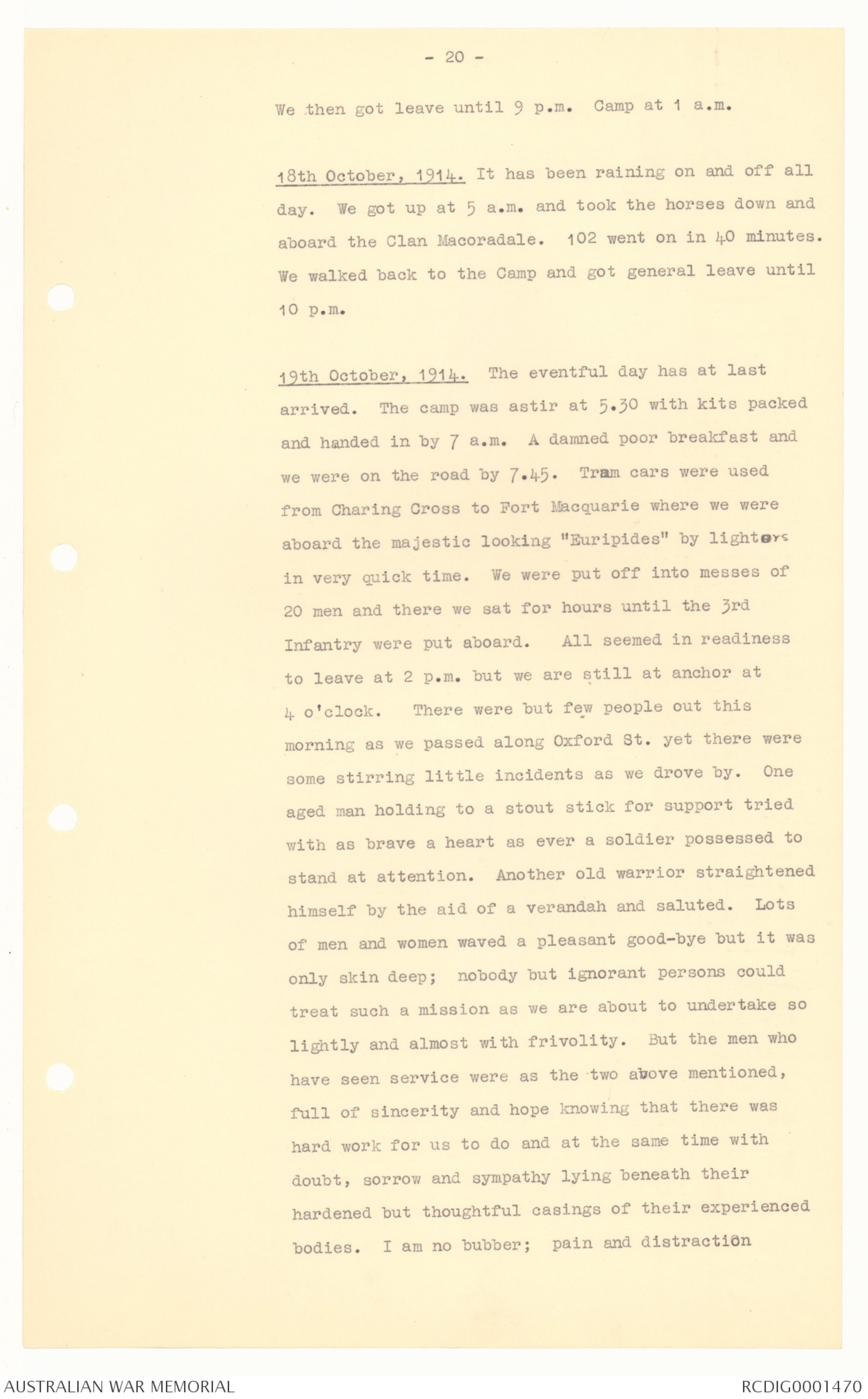
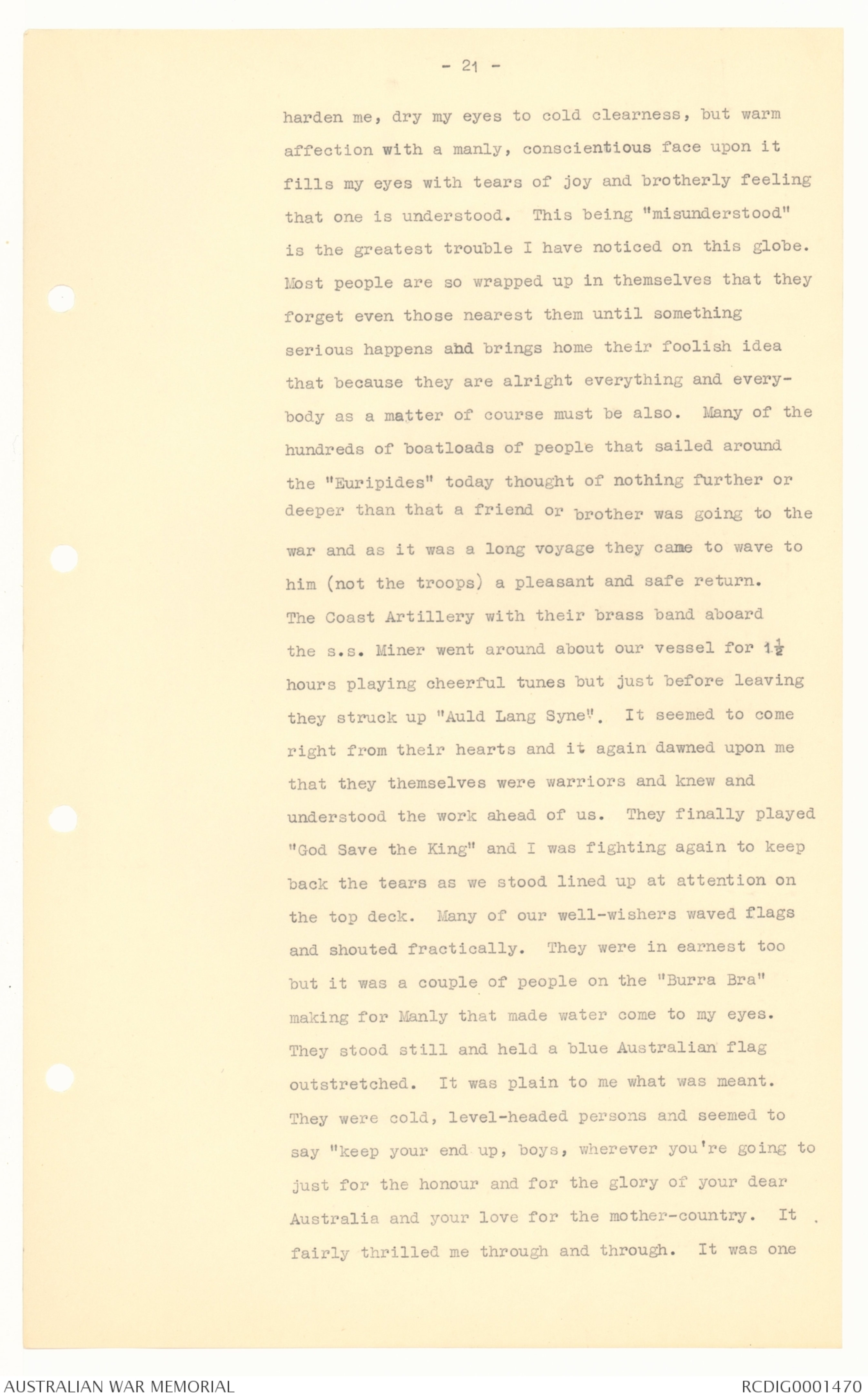
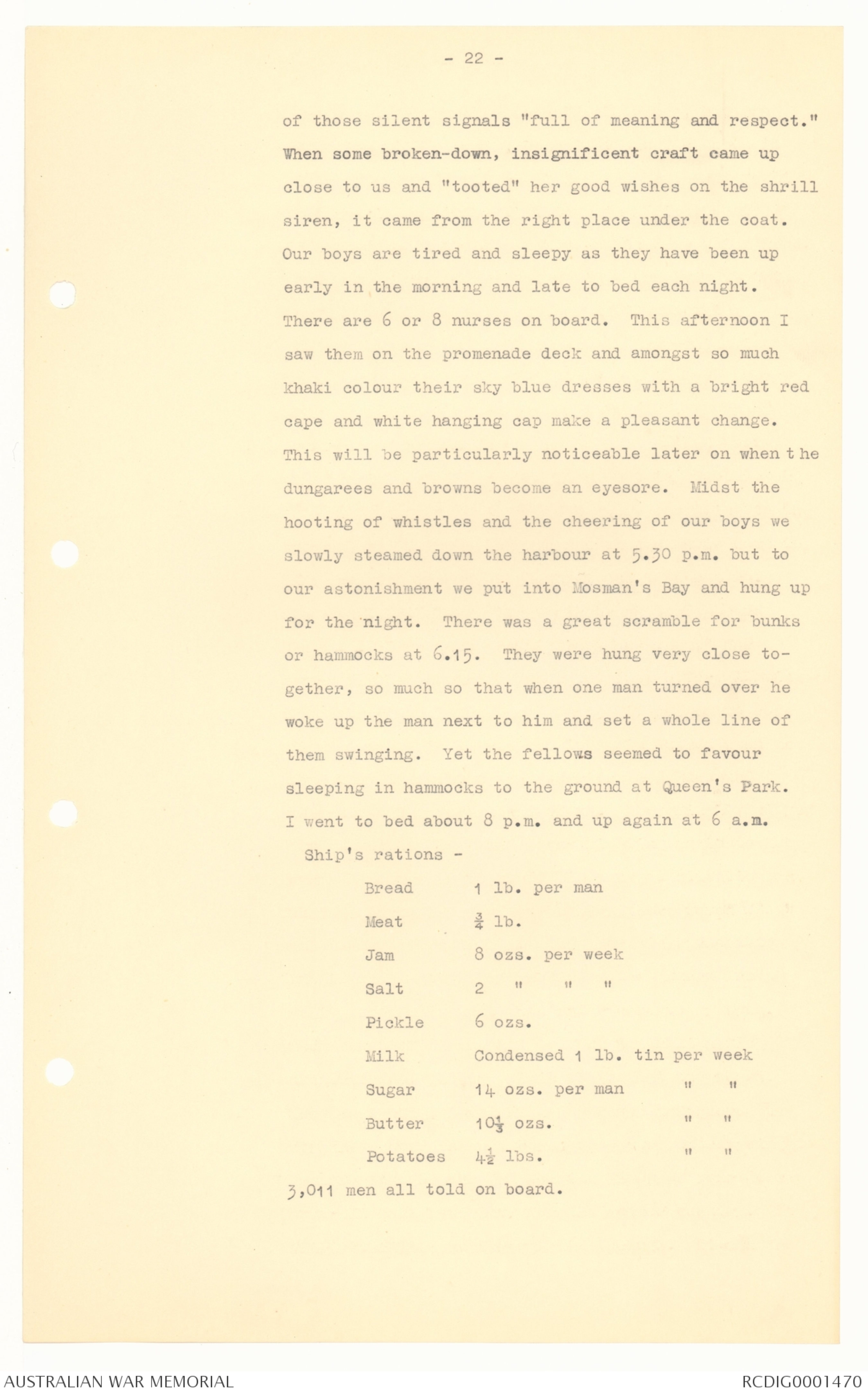
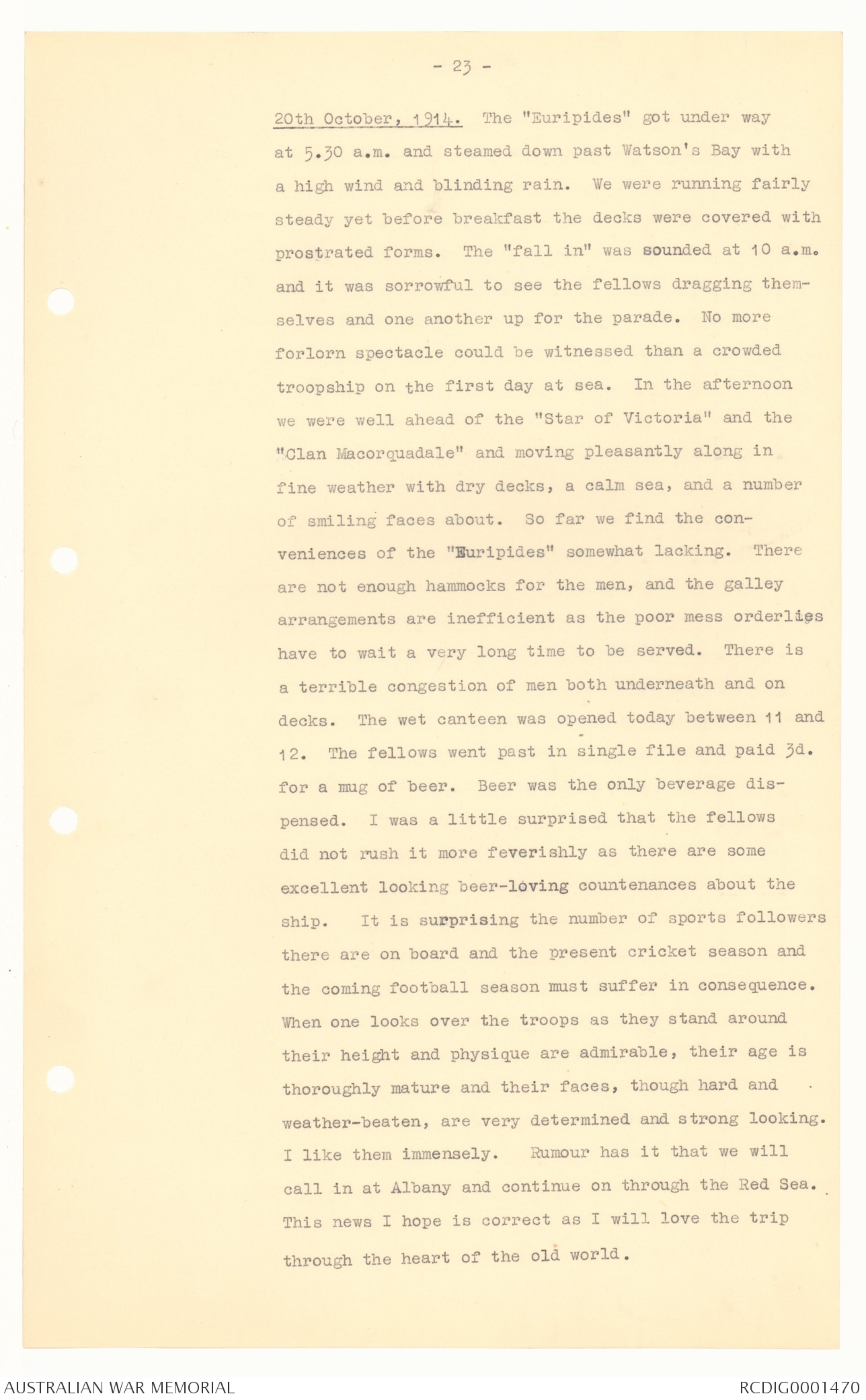
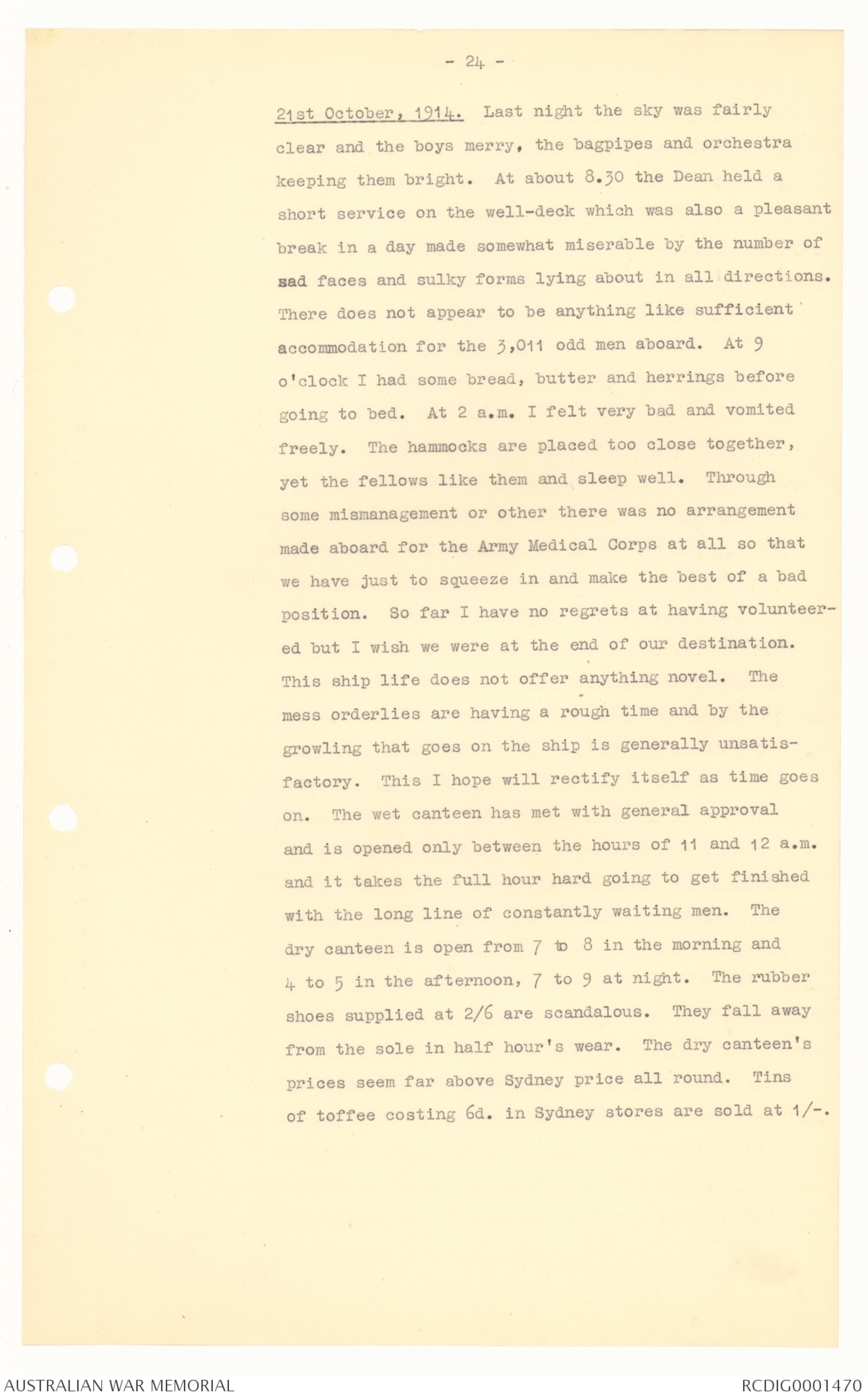
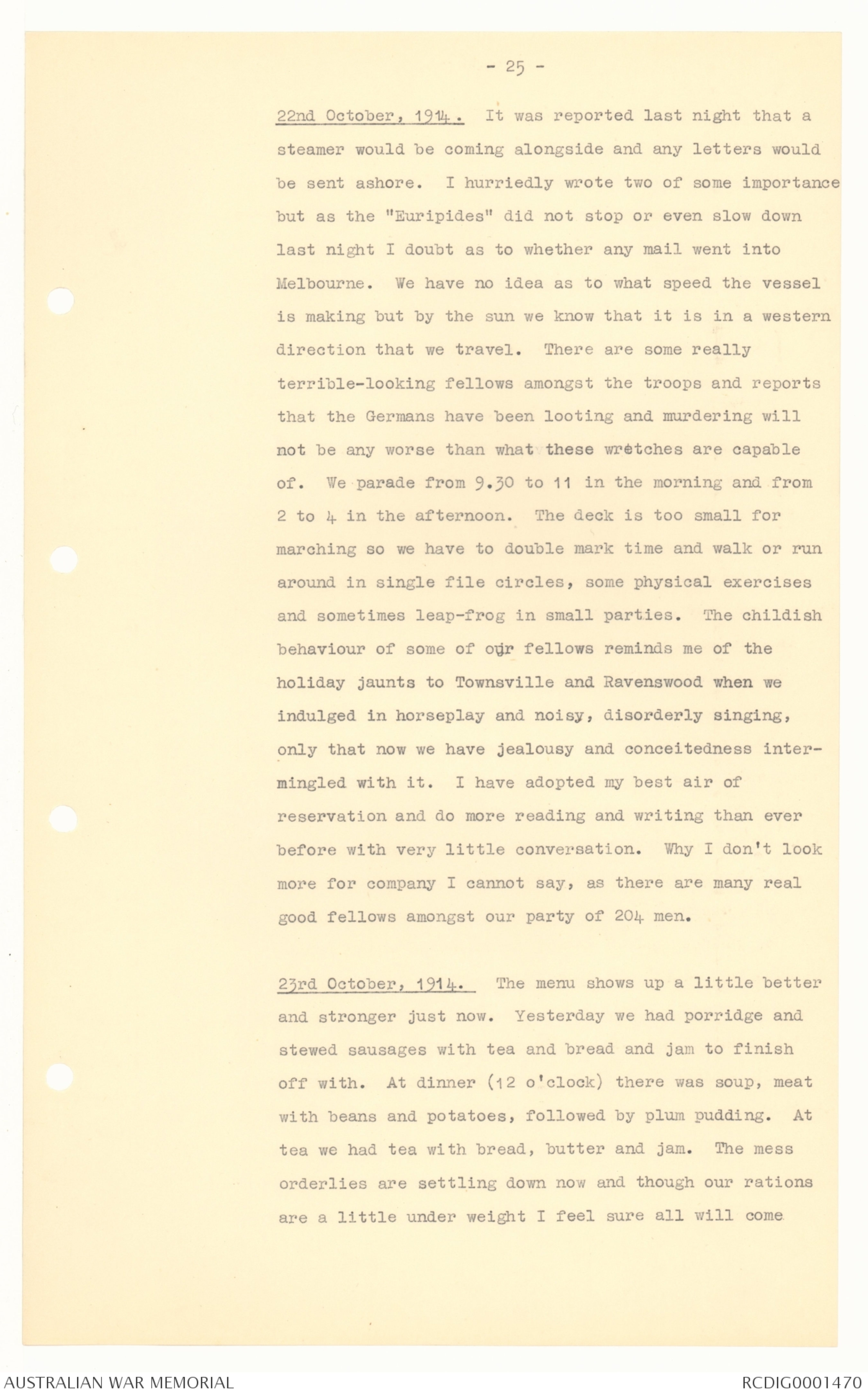
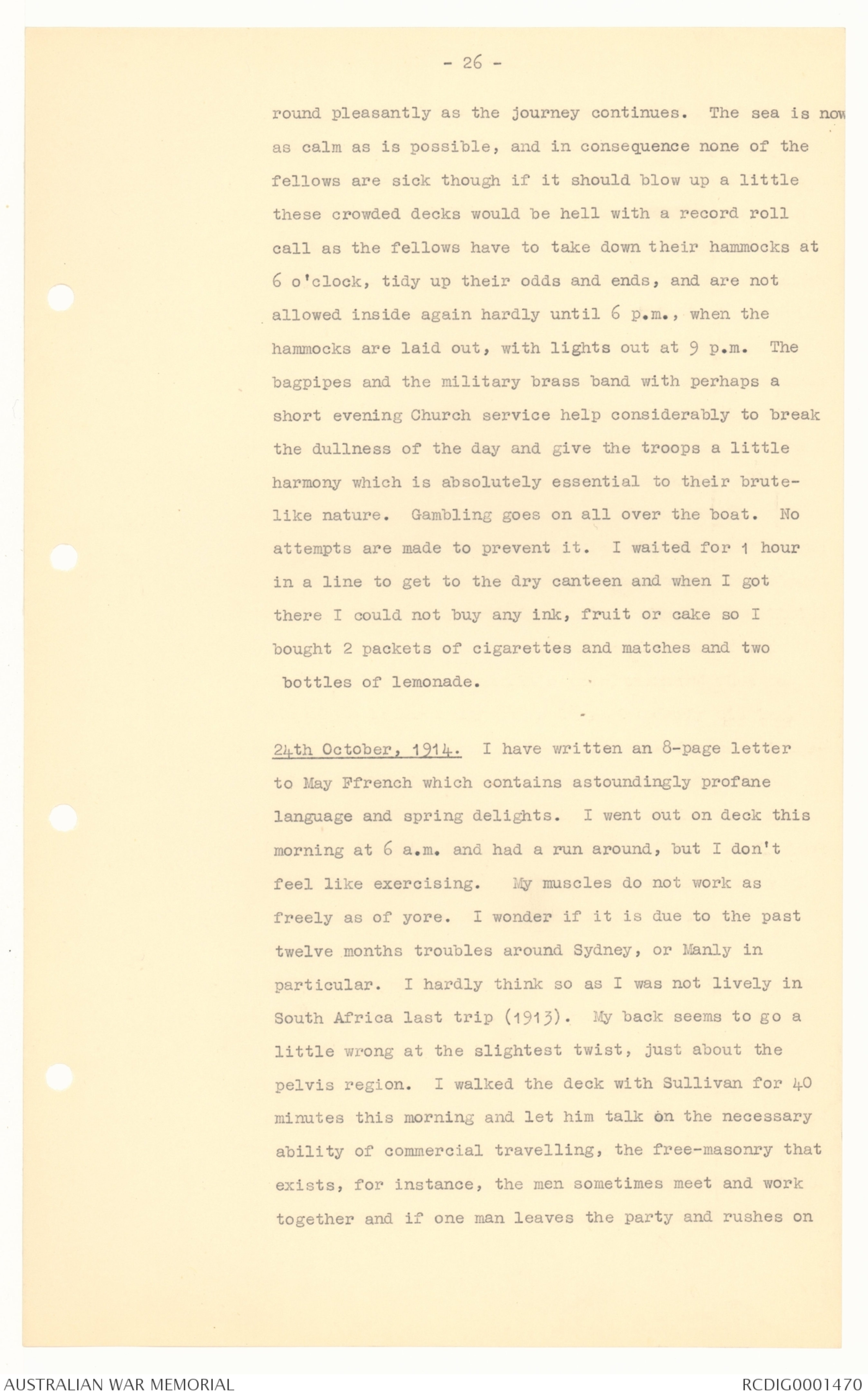
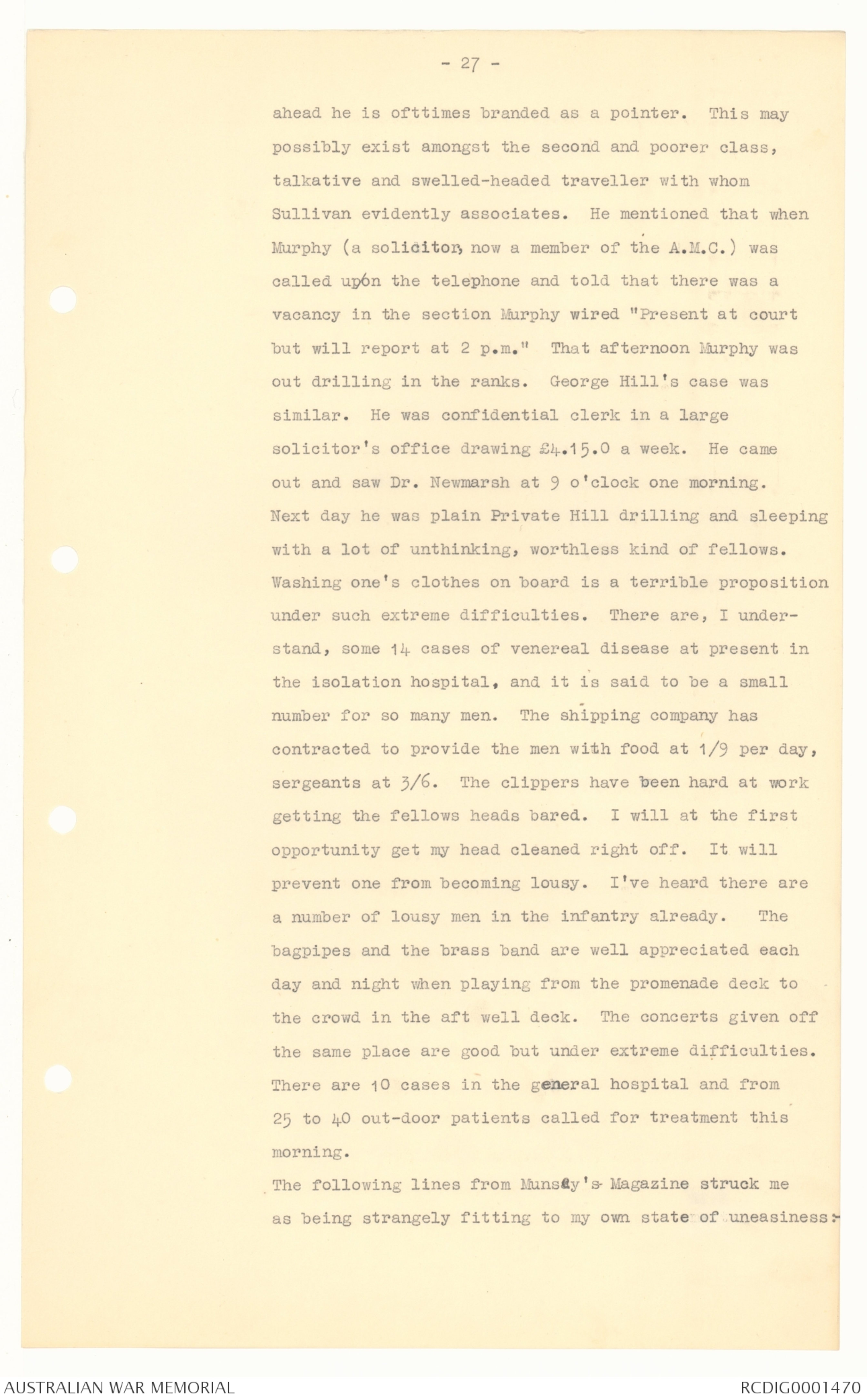
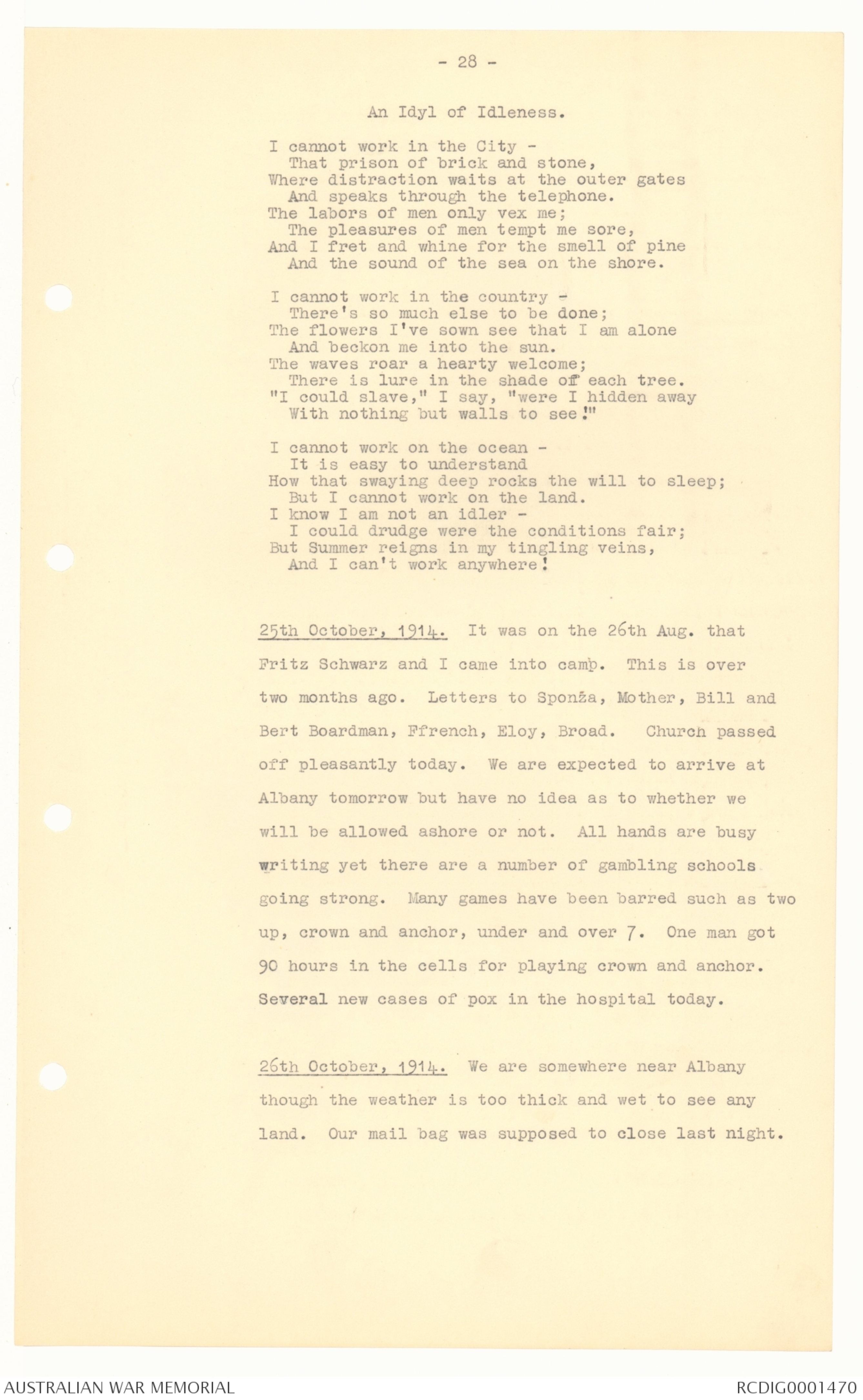
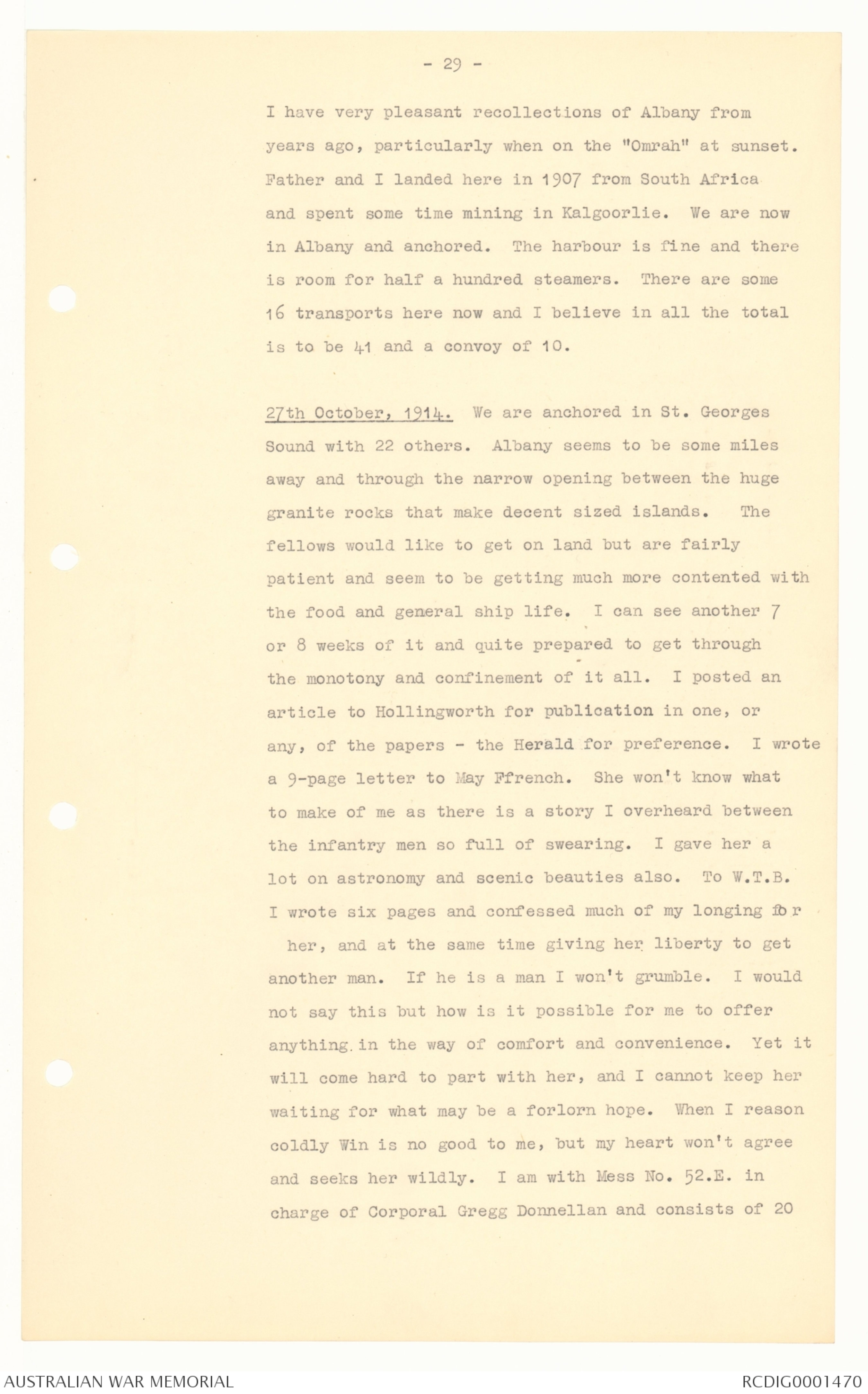
- 20 -
We then got leave until 9 p.m. Camp at 1 a.m.
18th October, 1914. It has been raining on and off all
day. We got up at 5 a.m. and took the horses down and
aboard the Clan Macoradale. 102 went on in 40 minutes.
We walked back to the Camp and got general leave until
10 p.m.
19th October, 1914. The eventful day has at last
arrived. The camp was astir at 5.30 with kits packed
and handed in by 7 a.m. A damned poor breakfast and
we were on the road by 7.45. Tram cars were used
from Charing Cross to Fort Macquarie where we were
aboard the majestic looking "Euripides" by lighters
in very quick time. We were put off into messes of
20 men and there we sat for hours until the 3rd
Infantry were put aboard. All seemed in readiness
to leave at 2 p.m. but we are still at anchor at
4 o'clock. There were but few people out this
morning as we passed along Oxford St. yet there were
some stirring little incidents as we drove by. One
aged man holding to a stout stick for support tried
with as brave a heart as ever a soldier possessed to
stand at attention. Another old warrior straightened
himself by the aid of a verandah and saluted. Lots
of men and women waved a pleasant good-bye but it was
only skin deep; nobody but ignorant persons could
treat such a mission as we are about to undertake so
lightly and almost with frivolity. But the men who
have seen service were as the two above mentioned,
full of sincerity and hope knowing that there was
hard work for us to do and at the same time with
doubt, sorrow and sympathy lying beneath their
hardened but thoughtful casings of their experienced
bodies. I am no bubber; pain and distraction
- 21 -
harden me, dry my eyes to cold clearness, but warm
affection with a manly, conscientious face upon it
fills my eyes with tears of joy and brotherly feeling
that one is understood. This being "misunderstood"
is the greatest trouble I have noticed on this globe.
Most people are so wrapped up in themselves that they
forget even those nearest them until something
serious happens and brings home their foolish idea
that because they are alright everything and everybody
as a matter of course must be also. Many of the
hundreds of boatloads of people that sailed around
the "Euripides" today thought of nothing further or
deeper than that a friend or brother was going to the
war and as it was a long voyage they came to wave to
him (not the troops) a pleasant and safe return.
The Coast Artillery with their brass band aboard
the s.s. Miner went around about our vessel for 1½
hours playing cheerful tunes but just before leaving
they struck up "Auld Lang Syne". It seemed to come
right from their hearts and it again dawned upon me
that they themselves were warriors and knew and
understood the work ahead of us. They finally played
"God Save the King" and I was fighting again to keep
back the tears as we stood lined up at attention on
the top deck. Many of our well-wishers waved flags
and shouted fractically. They were in earnest too
but it was a couple of people on the "Burra Bra'
making for Manly that made water come to my eyes.
They stood still and held a blue Australian flag
outstretched. It was plain to me what was meant.
They were cold, level-headed persons and seemed to
say "keep your end up, boys, wherever you’re going to
just for the honour and for the glory of your dear
Australia and your love for the mother-country. It
fairly thrilled me through and through. It was one
- 22 -
of those silent signals "full of meaning and respect."
When some broken-down, insignificent craft came up
close to us and "tooted" her good wishes on the shrill
siren, it came from the right place under the coat.
Our boys are tired and sleepy as they have been up
early in the morning and late to bed each night.
There are 6 or 8 nurses on board. This afternoon I
saw them on the promenade deck and amongst so much
khaki colour their sky blue dresses with a bright red
cape and white hanging cap make a pleasant change.
This will be particularly noticeable later on when the
dungarees and browns become an eyesore. Midst the
hooting of whistles and the cheering of our boys we
slowly steamed down the harbour at 5.30 p.m. but to
our astonishment we put into Mosman's Bay and hung up
for the night. There was a great scramble for bunks
or hammocks at 6.15. They were hung very close
together, so much so that when one man turned over he
woke up the man next to him and set a whole line of
them swinging. Yet the fellows seemed to favour
sleeping in hammocks to the ground at Queen's Park.
I went to bed about 8 p.m. and up again at 6 a.m.
Ship's rations -
Bread 1 lb. per man
Meat ¾ lb.
Jam 8 ozs. per week
Salt 2 " " "
Pickle 6 ozs.
Milk Condensed 1 lb. tin per week
Sugar 14 ozs. per man " "
Butter 10⅓ ozs. " "
Potatoes 4½ lbs. " "
3,011 men all told on board.
- 23 -
20th October, 1914. The "Euripides" got under way
at 5.30 a.m. and steamed down past Watson's Bay with
a high wind and blinding rain. We were running fairly
steady yet before breakfast the decks were covered with
prostrated forms. The "fall in" was sounded at 10 a.m.
and it was sorrowful to see the fellows dragging themselves
and one another up for the parade. No more
forlorn spectacle could be witnessed than a crowded
troopship on the first day at sea. In the afternoon
we were well ahead of the "Star of Victoria" and the
"Clan Macorquadale" and moving pleasantly along in
fine weather with dry decks, a calm sea, and a number
of smiling faces about. So far we find the conveniences
of the "Euripides" somewhat lacking. There
are not enough hammocks for the men, and the galley
arrangements are inefficient as the poor mess orderlies
have to wait a very long time to be served. There is
a terrible congestion of men both underneath and on
decks. The wet canteen was opened today between 11 and
12. The fellows went past in single file and paid 3d.
for a mug of beer. Beer was the only beverage dispensed.
I was a little surprised that the fellows
did not rush it more feverishly as there are some
excellent looking beer-loving countenances about the
ship. It is surprising the number of sports followers
there are on board and the present cricket season and
the coming football season must suffer in consequence.
When one looks over the troops as they stand around
their height and physique are admirable, their age is
thoroughly mature and their faces, though hard and
weather-beaten, are very determined and strong looking.
I like them immensely. Rumour has it that we will
call in at Albany and continue on through the Red Sea.
This news I hope is correct as I will love the trip
through the heart of the old world.
- 24 -
21st October, 1914. Last night the sky was fairly
clear and the boys merry, the bagpipes and orchestra
keeping them bright. At about 8.30 the Dean held a
short service on the well-deck which was also a pleasant
break in a day made somewhat miserable by the number of
sad faces and sulky forms lying about in all directions.
There does not appear to be anything like sufficient
accommodation for the 3,011 odd men aboard. At 9
o'clock I had some bread, butter and herrings before
going to bed. At 2 a.m. I felt very bad and vomited
freely. The hammocks are placed too close together,
yet the fellows like them and sleep well. Through
some mismanagement or other there was no arrangement
made aboard for the Army Medical Corps at all so that
we have just to squeeze in and make the best of a bad
position. So far I have no regrets at having volunteered
but I wish we were at the end of our destination.
This ship life does not offer anything novel. The
mess orderlies are having a rough time and by the
growling that goes on the ship is generally unsatisfactory.
This I hope will rectify itself as time goes
on. The wet canteen has met with general approval
and is opened only between the hours of 11 and 12 a.m.
and it takes the full hour hard going to get finished
with the long line of constantly waiting men. The
dry canteen is open from 7 to 8 in the morning and
4 to 5 in the afternoon, 7 to 9 at night. The rubber
shoes supplied at 2/6 are scandalous. They fall away
from the sole in half hour's wear. The dry canteen's
prices seem far above Sydney price all round. Tins
of toffee costing 6d. in Sydney stores are sold at 1/-.
- 25 -
22nd October, 1914. It was reported last night that a
steamer would be coming alongside and any letters would
be sent ashore. I hurriedly wrote two of some importance
but as the "Euripides" did not stop or even slow down
last night I doubt as to whether any mail went into
Melbourne. We have no idea as to what speed the vessel
is making but by the sun we know that it is in a western
direction that we travel. There are some really
terrible-looking fellows amongst the troops and reports
that the Germans have been looting and murdering will
not be any worse than what these wretches are capable
of. We parade from 9.30 to 11 in the morning and from
2 to 4 in the afternoon. The deck is too small for
marching so we have to double mark time and walk or run
around in single file circles, some physical exercises
and sometimes leap-frog in small parties. The childish
behaviour of some of our fellows reminds me of the
holiday jaunts to Townsville and Ravenswood when we
indulged in horseplay and noisy, disorderly singing,
only that now we have jealousy and conceitedness
intermingled with it. I have adopted my best air of
reservation and do more reading and writing than ever
before with very little conversation. Why I don’t look
more for company I cannot say, as there are many real
good fellows amongst our party of 204 men.
23rd October, 1914. The menu shows up a little better
and stronger just now. Yesterday we had porridge and
stewed sausages with tea and bread and jam to finish
off with. At dinner (12 o'clock) there was soup, meat
with beans and potatoes, followed by plum pudding. At
tea we had tea with bread, butter and jam. The mess
orderlies are settling down now and though our rations
are a little under weight I feel sure all will come
- 26 -
round pleasantly as the journey continues. The sea is now
as calm as is possible, and in consequence none of the
fellows are sick though if it should blow up a little
these crowded decks would be hell with a record roll
call as the fellows have to take down their hammocks at
6 o'clock, tidy up their odds and ends, and are not
allowed inside again hardly until 6 p.m., when the
hammocks are laid out, with lights out at 9 p.m. The
bagpipes and the military brass band with perhaps a
short evening Church service help considerably to break
the dullness of the day and give the troops a little
harmony which is absolutely essential to their brutelike
nature. Gambling goes on all over the boat. No
attempts are made to prevent it. I waited for 1 hour
in a line to get to the dry canteen and when I got
there I could not buy any ink, fruit or cake so I
bought 2 packets of cigarettes and matches and two
bottles of lemonade.
24th October, 1914. I have written an 8-page letter
to May Ffrench which contains astoundingly profane
language and spring delights. I went out on deck this
morning at 6 a.m. and had a run around, but I don't
feel like exercising. My muscles do not work as
freely as of yore. I wonder if it is due to the past
twelve months troubles around Sydney, or Manly in
particular. I hardly think so as I was not lively in
South Africa last trip (1913). My back seems to go a
little wrong at the slightest twist, just about the
pelvis region. I walked the deck with Sullivan for 40
minutes this morning and let him talk on the necessary
ability of commercial travelling, the free-masonry that
exists, for instance, the men sometimes meet and work
together and if one man leaves the party and rushes on
- 27 -
ahead he is ofttimes branded as a pointer. This may
possibly exist amongst the second and poorer class,
talkative and swelled-headed traveller with whom
Sullivan evidently associates. He mentioned that when
Murphy (a solicitor, now a member of the A.M.C.) was
called upon the telephone and told that there was a
vacancy in the section Murphy wired "Present at court
but will report at 2 p.m." That afternoon Murphy was
out drilling in the ranks. George Hill's case was
similar. He was confidential clerk in a large
solicitor's office drawing £4.15.0 a week. He came
out and saw Dr. Newmarsh at 9 o'clock one morning.
Next day he was plain Private Hill drilling and sleeping
with a lot of unthinking, worthless kind of fellows.
Washing one's clothes on board is a terrible proposition
under such extreme difficulties. There are, I understand,
some 14 cases of venereal disease at present in
the isolation hospital, and it is said to be a small
number for so many men. The shipping company has
contracted to provide the men with food at 1/9 per day,
sergeants at 3/6. The clippers have been hard at work
getting the fellows heads bared. I will at the first
opportunity get my head cleaned right off. It will
prevent one from becoming lousy. I've heard there are
a number of lousy men in the infantry already. The
bagpipes and the brass band are well appreciated each
day and night when playing from the promenade deck to
the crowd in the aft well deck. The concerts given off
the same place are good but under extreme difficulties.
There are 10 cases in the general hospital and from
25 to 40 out-door patients called for treatment this
morning.
The following lines from Munsey's Magazine struck me
as being strangely fitting to my own state of uneasiness:-
- 28 -
An Idyl of Idleness.
I cannot work in the City -
That prison of brick and stone,
Where distraction waits at the outer gates
And speaks through the telephone.
The labors of men only vex me;
The pleasures of men tempt me sore,
And I fret and whine for the smell of pine
And the sound of the sea on the shore.
I cannot work in the country -
There's so much else to be done;
The flowers I've sown see that I am alone
And beckon me into the sun.
The waves roar a hearty welcome;
There is lure in the shade of each tree.
"I could slave," I say, "were I hidden away
With nothing but walls to see!"
I cannot work on the ocean -
It is easy to understand
How that swaying deep rocks the will to sleep;
But I cannot work on the land.
I know I am not an idler -
I could drudge were the conditions fair;
But Summer reigns in my tingling veins,
And I can't work anywhere!
25th October, 1914. It was on the 26th Aug. that
Fritz Schwarz and I came into camp. This is over
two months ago. Letters to Sponźa, Mother, Bill and
Bert Boardman, Ffrench, Eloy, Broad. Church passed
off pleasantly today. We are expected to arrive at
Albany tomorrow but have no idea as to whether we
will be allowed ashore or not. All hands are busy
writing yet there are a number of gambling schools
going strong. Many games have been barred such as two
up, crown and anchor, under and over 7. One man got
90 hours in the cells for playing crown and anchor.
Several new cases of pox in the hospital today.
26th October, 1914. We are somewhere near Albany
though the weather is too thick and wet to see any
land. Our mail bag was supposed to close last night.
- 29 -
I have very pleasant recollections of Albany from
years ago, particularly when on the "Omrah" at sunset.
Father and I landed here in 1907 from South Africa
and spent some time mining in Kalgoorlie. We are now
in Albany and anchored. The harbour is fine and there
is room for half a hundred steamers. There are some
16 transports here now and I believe in all the total
is to be 41 and a convoy of 10.
27th October, 1914. We are anchored in St. Georges
Sound with 22 others. Albany seems to be some miles
away and through the narrow opening between the huge
granite rocks that make decent sized islands. The
fellows would like to get on land but are fairly
patient and seem to be getting much more contented with
the food and general ship life. I can see another 7
or 8 weeks of it and quite prepared to get through
the monotony and confinement of it all. I posted an
article to Hollingworth for publication in one, or
any, of the papers - the Herald for preference. I wrote
a 9-page letter to May Ffrench. She won't know what
to make of me as there is a story I overheard between
the infantry men so full of swearing. I gave her a
lot on astronomy and scenic beauties also. To W.T.B.
I wrote six pages and confessed much of my longing for
her, and at the same time giving her liberty to get
another man. If he is a man I won’t grumble. I would
not say this but how is it possible for me to offer
anything in the way of comfort and convenience. Yet it
will come hard to part with her, and I cannot keep her
waiting for what may be a forlorn hope. When I reason
coldly Win is no good to me, but my heart won't agree
and seeks her wildly. I am with Mess No. 52.E. in
charge of Corporal Gregg Donnellan and consists of 20
 Not Yet Replaced By AI
Not Yet Replaced By AIThis transcription item is now locked to you for editing. To release the lock either Save your changes or Cancel.
This lock will be automatically released after 60 minutes of inactivity.